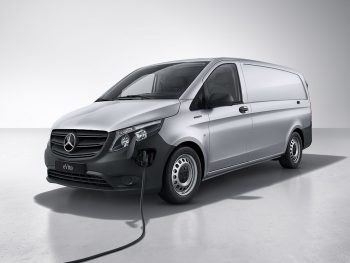The Government is extending availability of the Plug-in Van and Truck Grants for a further two years, ensuring fleets can benefit from them until at least 2024/25.

The move was confirmed today in an announcement by the Department for Transport as it also outlined new eligibility criteria.
While news on the Plug-in Car Grant was conspicuous by its absence, the announcement on vans and trucks brings certainty for fleet operators looking to electrify their commercial vehicle operations – an area of particular focus in the drive to net zero.
Announcing the move, the DfT said: “This aims to give certainty to fleets and vanmakers, supporting the still early market for zero emission vans and trucks. Plug-in van grant orders in 2021 were over 250% higher than in 2020, and the extension of the grant will support the continuation of this increased uptake.”
The move follows last year’s cut to plug-in grants on both electric cars and vans, which saw funding for small vans fall further to a maximum of £2,500, from the £3,000 level implemented in the spring 2021. And for large vans it fell to £5,000 from £8,000.
But alongside today’s announcement, the DfT also announced that it’s changing the eligibility criteria for the Plug in Vehicle Grant from 1 April 2022 – recategorising vehicles between 3.5 to 4.25 tonnes as large vans (qualifying for a £5,000 grant) rather than small trucks (up to £16,000 grant, 250 limit per year).
A spokesperson said: “With the increasing number of large vans on the market, the move will ensure government targets support where it’s most needed, allowing for heavier and more costly trucks, up to 12 tonnes, to benefit from the higher grant funding.”
It confirmed though that dealers will be able to submit orders for vehicles currently eligible and impacted by this change at the higher grant rate until 31 March 2022, subject to the 250-unit annual limit not being reached.
The final news in today’s announcement was that the Government will continue to allow drivers holding standard car driving licences to drive electric goods vans at a higher weight limit, up to 4.25 tonnes (compared to a 3.5-tonne limit for diesel vans). The change to the Category B regulations was first announced four years ago and allows for the extra weight of the battery.
The DfT said: “Today’s announcement is to reassure fleets that we have no plans to end this flexibility when it comes up for a five-year review next year. Rather, we are considering how to optimise the rules to support the emerging zero emissions van market.
“This will support our plans for all new vans to be fully zero emission by 2035, as we move towards our net zero climate goals and reduce harmful air pollutant emissions to protect human health.”
The announcements have been welcomed by the BVRLA.
Director of corporate affairs Toby Poston said: “This good news comes at the perfect time for the fleet industry as it struggles with rising operating costs and global shortage of electric vans. The two-year extension on the grant will enable van operators to plan their fleet upgrades with greater confidence.
“This prolonged van grant was a key pillar of the ‘Van Plan’ that the BVRLA launched last year and we are delighted that the Government has responded to our campaign. The electric van market continues to lag behind the electric car market and next year was not the time to remove this vital grant.”
He added that as the funds available to support the transition to zero emission diminish, the BVRLA supports the Government’s “pragmatic steps to focus on sectors that need the most help in the build-up to the 2030 phase-out”.
The UK’s Society of Motor Manufacturers and Traders (SMMT) also greeted the extension to the PiVG and the licence derogation.
Mike Hawes, SMMT chief executive, said: “Extending the Plug-in Van Grant is welcome as it will encourage more operators to make the switch to electric vehicles over the next three years. Furthermore, the confirmation of the continuation of the current licensing regulations will make it easier to recruit drivers for the heaviest electric vans.
“While the van market saw record electric uptake last year, it remains some distance behind cars, with battery electric vans making up just 3.6% of new registrations. The speed of uptake must be increased, therefore, which requires attractive incentives and significant investment in EV charge points especially those that meet the specific needs of commercial vehicles in every region of the UK.”

